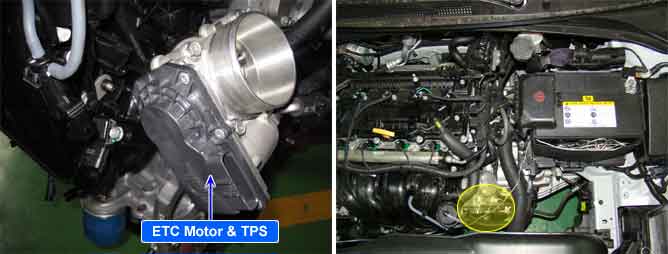

The Electronic Throttle Control(ETC) system is made of the components throttle body, Throttle Position Sensor(TPS)1&2 and Accelerator Position Sensor(APS) 1&2. TPS1&2 are sharing the same source voltage and ground. The throttle valve opening is control by throttle motor which is controlled by Engine Control Module(PCM). The opposite position indicator shows inverted signal characteristics. TPS1 output voltage increases smoothly in proportion with the throttle valve opening angle after starting. TPS2 output voltage decreases in inverse proportion with the throttle valve opening angle after starting. TPS provides feedback to the PCM to control the throttle motor in order to control the throttle valve opening angle properly in response to the driving condition.
PCM sets DTC P0222 if the PCM detects signal voltage lower than the possible range of a properly operating TPS2.
Item | Detecting Condition | Possible Cause | |
DTC Strategy |
•
Short to Ground or Open circuit | 1. Open in power supply harness or signal harness 2. Short to ground in power supply or signal harness 3. Poor connection or damaged harness 4. Faulty TPS2 | |
Case1 | Enable Conditions |
•
Ignition "ON" | |
Threshold Value |
•
TPS2 < 0.1V | ||
Case2 | Enable Conditions |
•
Ignition "ON"
•
In idle status
•
Target throttle angle < 58%
•
MAF Limphome detected or TPS1 failure detected | |
Threshold Value |
•
TPS2 at idle < 2.0V | ||
Diagnostic Time |
•
0.05 sec. | ||
MIL On Condition |
•
1 driving cycle | ||
Limp-Home |
•
Forced limited power mode : When the DTC is set, the PCM reduces engine torque by 25% of normal value.
•
The PCM uses TPS1 signal to monitor the controlled opening angle of the throttle valve. | ||